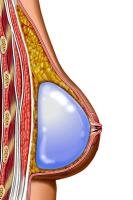Quest For The *Perfect Woman*?~Part II

A series of studies since 2003 has found a surprisingly high suicide rate among women who have had cosmetic breast implants, sparking a controversy about the procedure.
A Finnish study showed that women who had cosmetic implants were more than three times more likely to commit suicide than the general population -- in line with findings from a similar study of Swedish women and one of American women conducted by the National Cancer Institute.
All three studies also found that women with implants had overall death rates the same or better than the general populations, suggesting that the implanted devices were not causing disease during the time period studied, as once feared.
But the studies all noted the suicide rate as significantly -- and at this point inexplicably -- higher than expected.
The question of why women with implants are so much more likely to commit suicide has become a controversial one
The Finnish study reported on 2,166 women, some of whom had the implants as long as 30 years ago. It was conducted by the private International Epidemiology Institute of Rockville, Md., and funded by Dow Corning Co., a former manufacturer of silicone breast implants. Dow Corning also funded the larger Swedish study, which examined 3,521 women with implants and also found a suicide rate about three times above normal.
"The ironic thing is that nobody was looking for this suicide information," said Joseph McLaughlin, lead investigator on the Finnish study, "There have been lots of studies of women with breast implants, and the only consistent finding that's problematic is the suicide excess."
Some researchers contend the high suicide rate is a result of the psychological makeup of the women choosing implants -- that they are, as a group, women with problems different from the general population.
Numerous studies have found that women who receive all kinds of cosmetic surgery are wealthier and healthier than the norm.
Diana Zuckerman, president of the National Centre for Policy Research for Women & Families and a long-time critic of cosmetic breast implants, said that while it remains unclear why the suicide rates are high, it is significant that they are.
"Tripling the risk of suicide is a shocking finding -- growing evidence that the 'cure' might be worse than the problem it is supposed to solve," she said. "We can't just go along with the manufacturer's assumptions that implants are great for women's mental health."
In an article accompanying the Finnish study, University of Pennsylvania professor David Sarwer argued that plastic surgeons should make greater efforts to understand the psychological and emotional state of women seeking implants. He wrote that if a woman shows signs of instability or a history of psychiatric care, mental health professionals should be contacted before any implants are approved.
Sarwer said that 7 to 15 percent of women having plastic surgery have dysmorphic disorder, a preoccupation with a slight or imagined defect in appearance. He said that these women in particular do not respond well to cosmetic surgery.
The scientists suggested that cosmetic surgeons should evaluate women who want breast enlargement for any signs of psychological problems.
"If women have a psychological problem and they are given breast implants they will still have that problem," said Koot, who reported the finding in the British Medical Journal.
The numerous data I have found researching breast implants and suicide go back as far as 2003. I have been unable to find a study suggesting that the pressure women are under to conform to an unnatural male image set by men and media are in anyway behind the breast enlargement and suicide phenomena. Concentrating on greater disposable income, programmes such as "Nip & Tuck or domains such as women’s magazines, in which psychological experts provide ‘facts’ about women’s ‘body image problems’, and offer advice and psychological treatments. Nothing to do with every way you look in the media there's a big pair of plastic tits ready to poke ya eyes out! Demanded of course by men for their 24hr reality Planet Porn Show. They also talk of women's "psychological problems" and "dysmorphic disorder" and waffle on about Plastic Surgeons assessing women’s mental health prior to surgery. Since when was a surgeon a psychiatrist or psychologist? and since when were women the ones with the *real* (as in the origional) "psychological problems"?


0 Comments:
Post a Comment
<< Home